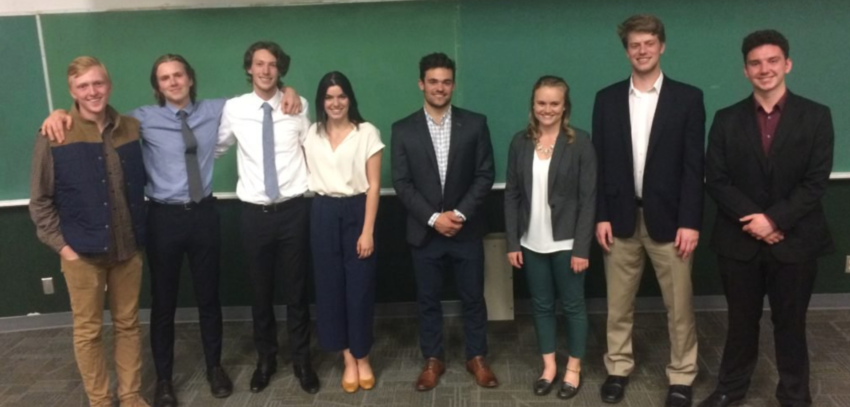That would be UO student diversity of thought. Emerald reporter Mateo Sundberg has the report on yesterday’s debate in a packed PLC 180 classroom between the student Republicans and Democrats.
Before clicking on the link for the story here, please humor me and enter your guess in the comments as to whether the College Democrat debaters are the 4 on the left or the right of Sundberg’s photo, just because I’m wondering if everyone is as bad at predicting this as I am:
When talking about diversity, Provost Banavar often notes how boring it would be to live in a world where everyone thinks the same. So it’s good to hear that’s not the world our students live in at UO.
But what about us faculty? Back in 2006 I matched the Lane County voter registration file to a list of UO professors. Out of about 700 faculty, 506 could be matched by name in both files. Of those 506 there were 25 registered Republicans.
Here’s the distribution of Oregon and Lane County voters, compared to UO:
By college, it looked like this:



The haircuts give it away.
I admire the kids who are willing to stand up and come out as Republican. In this political climate, and given the monoculture at UO, it’s a serious risk. But if things are going to return to some semblance of normal, this is needed.
My guess, Republicans on the right as seen in the photo.
Yes, UO Matters a few years back certainly uncovered some amazing statistics. Now the phenomenon is widely known to be pervasive in the prestigious segment of academia.
You see the lack of political intellectual diversity at UO in the speakers who come to campus. Speakers who talk of politically tinged things almost without exception are of the left. The few “conservative” speakers are actually liberals or leftists who have run afoul of the current leftist orthodoxy. It is worse than it used to be, when there would be an occasional visit from someone like James Q. Wilson, Harvey Mansfield, or Victor D. Hanson, usually under the auspices of the Kritikos lectureship. It would be hard to imagine someone like Charles Murray or Amy Wax getting invited here for a major presentation.
You see it also in the policies of the University and the state. The coming mandated cultural competency training, at the behest of the Legislature. The University’s policy of at least claiming to judge contributions to “diversity” in post-tenure review, tenure, and promotion. The Bias Response Teams, the incessant Title IX activity (required, of course, by the federal government), the racially exclusive programs, and so forth. One either is with the program or one keeps one’s mouth good and shut.
In Oregon, the better part of the public is probably with the program, or at least OK with it. Those who aren’t mostly shun UO, in all likelihood. So the University can get away with it without too much tangible loss. In places like Missouri and Wisconsin, the backlash is definitely having a negative effect.
I think we as academics are shortchanging ourselves and the students. I don’t know if the classroom at UO is as polarized as some people claim it is nationwide. I hope not, but I haven’t much way of knowing.
I voted for Ralph Nader and championed gay marriage before most of these kids were born. It’s been a bit shocking to discover that I’m now one of the bad guys (by UO standards). Oh well…
“In Oregon, the better part of the public is probably with the program, or at least OK with it. Those who aren’t mostly shun UO, in all likelihood”
In my experience, having come from Southern Oregon, the distribution of political beliefs (as distinct from affiliation), seems to be more evenly distributed outside of Eugene and Portland; though still right-skewed. This is based on 30+ years of living there, and I don’t have data to backup the claim.
Also anecdotally, I find in my interactions with friends and family outside of Eugene/Portland that most are ignorant of UO’s heavily left-leaning culture. People seem to think of UO as a sports program first, and assume that the achievements therein are an indicator of the quality of education provided.
Are you saying that things are more leftward (“still right-skewed”) outside of Portland/Eugene? I don’t believe that is the case at all, do you?
Do you think that people believe that the supposed sports success of UO is an indicator of high academic quality?
You may be right that people are just unaware of the leftward tilt at UO (and, probably, at most of the other campuses). Perhaps I just assume that they are aware.
Yes to all questions. I haven’t spent any time in eastern Oregon, and political beliefs may be much different there than in Southern Oregon, but in the Medford/Grants Pass area I would say folks are mostly moderate with a slight lean left. Much further left in Ashland.
People in SO talk an awful lot more about Duck sports than Duck academics. It is really a big part of people’s lives there because it is the closest thing they think they have to professional sports in Oregon (save for the Blazers). Note that I care very little for sports personally, so I’m not projecting here.
There seems to be a halo effect where people assume high academic quality because of the reputation of the sports program. Frankly, most people don’t follow UO nearly as closely in SO as they do here in Eugene.
Possibly of interest: Testing a Beckerian-Arrowian Model of Political Orientation Discrimination on the U.S. Law Professor Labor Market: Measuring the ‘Rank Gap,’ 2001-2010
Not really surprising, but good to have it documented. Kind of interesting that the lower-ranked schools are less viewpoint-tolerant. Also interesting that apparently those who merely keep their mouths shut do poorly. If you want to do well, you must signal as liberal.